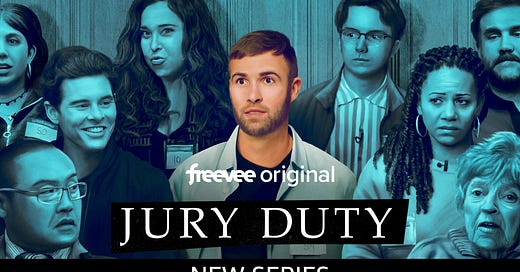Is Jury Duty the best new crime fiction series on TV?
This was supposed to be a post about Barry!
Look, Barry is probably better. But Freevee’s eight-episode reality-comedy series sure seems to capture something new about both sides of that hyphenated genre.
I’m not going to give away too much about the show because part of the pleasure is watching it unfold in all its unhinged and stakes-raising glory. But allow me to make my case that it is a piece of crime fiction. Because the premise—everyone involved with the trial and jury is an actor except for one Truman Show-esque dude (Ronald)— requires filming a (fake) civil trial from the seating of a jury through its deliberations, each episode illuminates, and at times skewers, elements of the criminal justice system: what could be more crime fiction-y than that?
The complainant in the case is an heiress who can afford good counsel, and the defendant is decidedly not. Neither of them fit the bill of a “sympathetic victim,” and the writing team managed to foresee the Gwynocent of it all in a way that is straight-up prophetic. The episodes also manage to explore voir dire, standards for ineffective assistance of counsel, sequestration, and corporate malfeasance along with the gender assumptions attached to the name “Cody,” and how best to get trashed at a Margaritaville.
Because Jury Duty is a reality show pretending not to be one, it captures the inherent performativity of all trials. Presenting arguments in court is at heart storytelling: one about guilt, and one innocence. The prosecution and defense each create and narrate stories, and hope the jury thinks theirs is better. Just like on the show, they’re actors and they’re not.
Every episode is hilarious for all sorts of reasons that have nothing to do with crime fiction.1 But when the eleven actors and Ronald enter deliberations, the way they discuss the narratives that have been presented to them doesn’t feel smug or silly at all. Rather, the way Ronald in particular takes his position as foreman seriously and sincerely is pretty inspiring. Some of the jurors make arguments that are so reminiscent of 12 Angry Men I can’t help but think it’s intentional, so perhaps part of the project of the show is also to explore, and maybe to endorse, the monologue given by Juror #11, a European refugee, in the 1957 crime fiction classic:
“We have a responsibility. This is a remarkable thing about democracy. That we are … what is the word? … Ah, notified! That we are notified by mail to come down to this place and decide on the guilt or innocence of a man we have not known before. We have nothing to gain or lose by our verdict. This is one of the reasons why we are strong.”
And a lot to do with the genius comedic stylings of one James Marsden. Cast this man in more comedies, cowards! But honestly, every participant has improv skills that boggle the mind.




